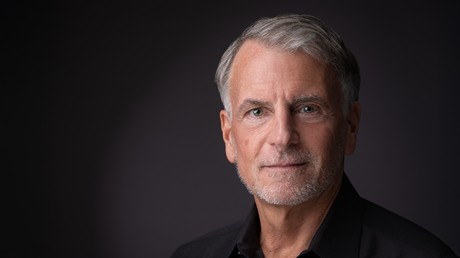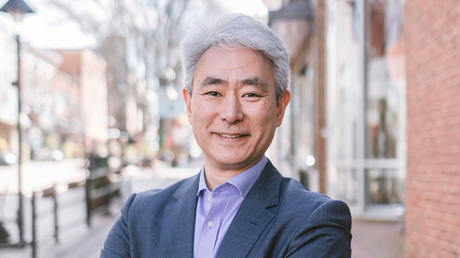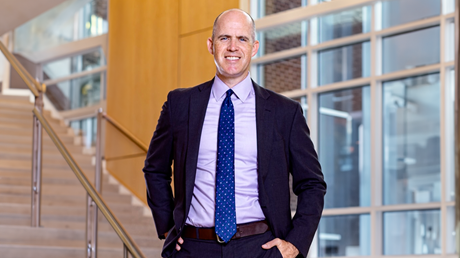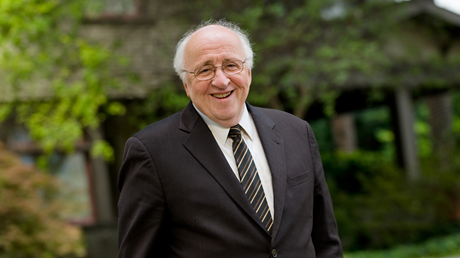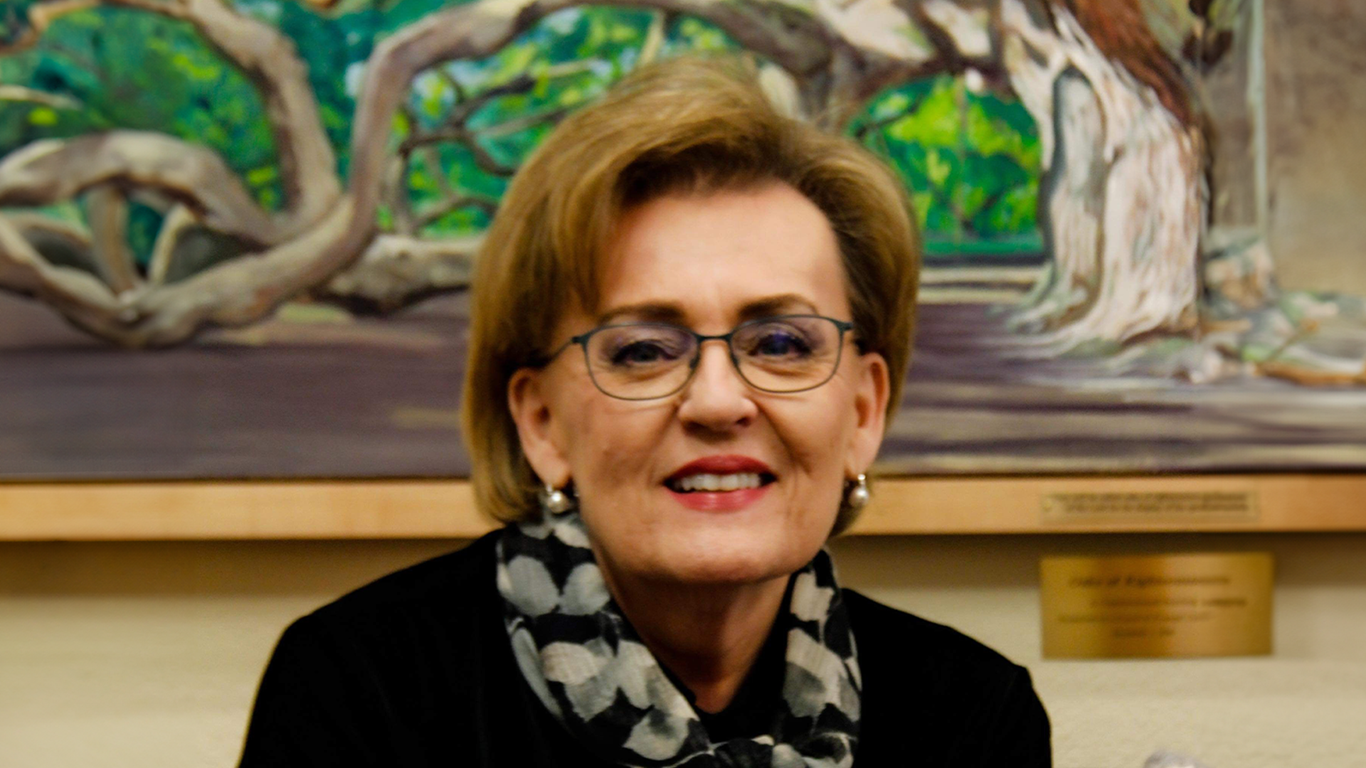
Will you help encourage and connect the church?
Give NowWill you help encourage and connect the church?
Give NowInterviewing someone about who they are leaving in their will might seem like an awkward conversation. How do you talk to a stranger about their money, their mortality, and the legacy they want to leave behind? But for Carol Taylor, adding Christianity Today to her will was an easy decision because of how she sees CT casting a wide net to share the core of the gospel.
“Everything I have seen,” she said, “suggests to me that there’s continued to be this focus on what the original vision of Christianity Today was and is today ... an appreciation for true scholarship, and not just theological [scholarship], but even in the arts. We’ve realized the church is a lot bigger than the church in America.”
Carol put Christianity Today in her will for a simple reason: CT has stayed true to its founding vision to share relevant, timely stories of Christianity around the world, and it has done so with integrity, even when the world seems to be in constant turmoil.
Carol Taylor started her career as an elementary school teacher at a Greek Orthodox school in Chicago. After three years and graduate school, she entered the world of higher education and eventually became president of Vanguard University during one of the most tumultuous periods in the school’s history—it was on the verge of losing its accreditation and potentially shutting down.
Many people advised her to abandon the sinking ship, but in the midst of all the turmoil a quiet voice seemed to ask, What if this is why you came? Later during some of the darkest moments of Vanguard’s turnaround, she wondered if she had come to provide hospice care for a dying institution.
The phrase hospice care can evoke a dreadful picture. But shortly before coming to Vanguard Carol had been in a position of caring for her brother during his battle with cancer and had witnessed the care of hospice providers at the end of life. This would just be a different kind of care—done for a whole institution.
She describes what happened next as a miracle from God: the entire school tackled what seemed an impossible list of requirements to reestablish its accreditation and was removed from probation after only one year.
“We lived by the African proverb “When you pray, move your feet.” We did both with great intensity. My only response is that God helped us.”
Having served as a Christian university president for two institutions, Carol developed a deep appreciation for those who financially invested to ensure the continued life of these universities and found herself reflecting on what she wanted her legacy to be. In other words, how could she offer the same kind of end-of-life care through her finances?
After retiring, she downsized and re-examined her trust allocations with the goal of helping sustain organizations whose missions were focused on sharing the good news of Christ, equipping Christians to be His presence in the world, and who had a history of functioning with the highest integrity.
Carol decided to add Christianity Today to her will. She had been giving to CT for years, and when CT reached out to her about The 1956 Society—a society for CT supporters who want to include CT in their will or estate—she chuckled and responded that she had already named CT in her will.
“When I read about [The 1956 Society], I thought, Well, I already did it. So I let Cory [Whitehead, CT’s vice president of mission advancement] know. I said, ‘Actually I already have you guys written in, I just didn’t think to tell you that I’d done that!’”
When asked why she wanted to contribute to Christianity Today in such a profound way, she cited a couple of reasons. First, she remembers her parents subscribing to three Christian magazines as she grew up. One was CT.
But the most compelling reason is that she sees Christianity Today as a leader in how to be an organization with integrity and honesty when it comes to reflecting on evangelicals’ history.
“From 1956—the founding of Christianity Today—to today, I haven’t seen a time that, as an organization, CT has departed in some significant way from the founding vision: promoting the truth of the gospel with a wide net. [CT is] not just for Presbyterians or Methodists, but represents the core of our faith, which is what unites all of us. I feel very good about having [CT] on my list.”
In 2021, Carol was reading about various scandals in churches and parachurch organizations and watching the mobs at the Capitol with its contrasting Christian iconography when she thought to herself, What in the world is going on with the church?
“But I kept watching, especially Christianity Today’s response to all of this; I listened to the CT podcast The Rise and Fall of Mars Hill. I watched some of the decisions that CT made to remind the church what the gospel is and pointing us back to Christ,” she said. “Not in some simplistic way, but deep, thoughtful, reflective ways.”
With all of the chaos going on, she thought back to Billy Graham. She sees him as a model for someone who had every opportunity to indulge in fame and vanity but instead kept the gospel at the center of his ministry.
The vision that Billy Graham cast in 1956 is the same vision that Carol sees Christianity Today pursuing today, almost 70 years later.
Carol cited Micah 6:8 as a verse that Christians, and Christian organizations, are called to pursue: “He has shown you, O mortal, what is good. And what does the Lord require of you? To act justly and to love mercy and to walk humbly with your God.” Carol believes Christianity Today obediently follows that calling.
As the American church battles Christian nationalism and ongoing reports of abuse and mismanagement within congregations and ministries, Carol sees an opportunity for other organizations to follow in CT’s footsteps in being transparent about their histories—as CT did in 2022, reporting on an investigation into its own staff culture.
Instead of rejecting CT, Carol saw this as an incredible model for how institutions should examine themselves. She noted that all organizations are flawed because they are run by flawed humans, but how an organization responds makes all the difference. It’s one thing to point to a person no longer with the organization and a very different thing to look deeper at the culture, values, and practices that allowed abuse and/or mismanagement.
“The fact that you were transparent about that, I thought, Are people paying attention? Pay attention, folks, this is what it looks like to do this well. And my respect for Christianity Today grew immensely,” she said.
Carol saw CT doing what it had been telling other organizations to do. It wasn’t enough to say that the person who’d caused problems was gone; changes were needed to help and protect employees going forward. She applauded CT’s transparent and honest reflection about what had occurred and the environment that allowed it to happen. And she remembered two traits her father used to stress as vitally important: honesty and integrity.
“He would say to me, ‘Integrity matters, character matters.’ And probably more than anyone, I got to see what that looked like in his own life, where you might make decisions that cost you personally because it was the right thing to do.” Those two traits are what continue to draw her into Christianity Today’s work.
Today, she enjoys listening to CT’s various podcasts. She especially enjoyed Holy Curiosity, a podcast hosted by Kat Armstrong that highlights God’s craft of storytelling. She also loves CT’s annual book awards, even though they “ruin” her reading list each year (though in a good way, she jokes) by recommending so many great books.
As CT continues to report on stories of Christians around the world, Carol feels encouraged by its dedication to its original mission.
“My encouragement for Christianity Today is, don’t lose the focus on the wonder and majesty of Christ. That is the hope of the world. Whatever is going on now, keep drawing us back to this person of Christ. That’s one of the beauties of Christianity Today—don’t ever stop highlighting the beauty and hope of Christ. That was Billy Graham’s message at the core.”


